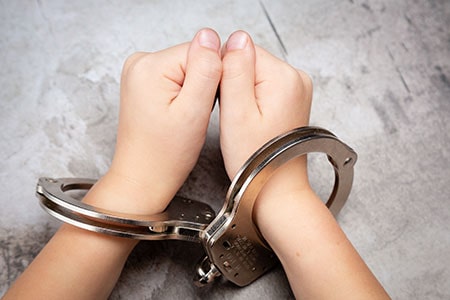
What Is Juvenile Court?
In Maryland, any person under the age of 18 is considered a juvenile. Because state law dictates that a juvenile who commits a delinquent act is treated differently than an adult, juvenile cases are heard in the Juvenile Court system, which is separate from the state’s other courts.
The distinct court system and special treatment for juveniles is intended to shield them from the taint of criminality.
The Juvenile Court also protects minors who are the victims of child abuse and child neglect. The Juvenile Court also hears cases about minors who are considered “unmanageable and ungovernable.”
What Kinds of Cases Are Heard In Juvenile Court?
Generally, up to seven kinds of cases are heard by the Juvenile Court, including:
- Delinquency – A child is delinquent if: 1) the child commits an act which would be a crime if the child were 18 years old (legally an adult); and, 2) the child requires guidance, treatment or rehabilitation. Some juveniles may be tried as adults in criminal court rather than juvenile court, depending upon the severity of the delinquent act, the youth’s age, prior delinquent findings, the mental and physical condition of the child and other factors.
- Child in Need of Assistance (CINA) – A CINA case involves a child who has been physically, sexually, or emotionally abused or neglected by a person who is responsible for the child’s care.
- Child in Need of Supervision (CINS) – A CINS case involves a child who has committed a “status offense,” such as truancy, violation of curfew laws, running away, habitual disobedience, and ungovernable behavior.
- Citations – When a juvenile has allegedly violated a provision of the Alcoholic Beverages laws, such as possessing alcohol or misrepresenting one’s age to purchase alcohol, or is charged with drinking or possessing intoxicating beverages on school premises, the juvenile is issued a citation to appear in Juvenile Court.
- Contributing – Cases concerning adults who are charged with contributing to conditions that render a child delinquent, CINA or CINS begin in Juvenile Court, but are usually transferred to criminal court.
- Interstate Compact – Children who run away across state lines, either in or out of Maryland, are governed by the Interstate Compact on Juveniles.
- Violations of Compulsory Public School Attendance – The Juvenile Court may hear cases arising under the Compulsory Public School Attendance laws of Maryland.
Are All Juvenile Offenders Sent to Juvenile Court?
Most Juvenile Court cases are initially processed by the local Juvenile Services Agency intake office. An intake officer decides to either close a case, send the child to a diversion program for treatment and guidance, or refer the case to the State’s Attorney’s office.
Most serious delinquency complaints involving a child 16 years of age or older bypass the intake officer and go directly to the State’s Attorney’s office, which may request that the offender be tried as an adult in criminal court. The judge rules on accepting the State’s Attorney’s request at the waiver hearing.
What Happens In the Juvenile Court?
In most cases where the child’s well-being may be threatened or the minor is considered dangerous, the initial proceeding in Juvenile Court is the detention or shelter care hearing. The master or judge may decide to detain the alleged delinquent juvenile in a secure facility for a period of up to 30 days pending a trial, which is called the adjudicatory hearing.
The master or judge may decide to place the child involved in an alleged CINS, CINA or delinquency case in shelter care, such as a temporary foster home, for a period of up to 30 days pending the adjudicatory hearing.
For those cases that are not considered emergencies, the first action in Juvenile Court is usually the adjudicatory hearing. In some Maryland counties, however, a preliminary hearing is held prior to the trial to advise the child and his/her parents of the allegations in the petition and to determine if an attorney is desired to represent the child and/or parents. If the juvenile is detained or placed in shelter care, the adjudicatory hearing must take place within 60 days of the date the petition was served on the child and parents.
The juvenile and/or the parents are entitled to the assistance of legal counsel at every stage of a Juvenile Court proceeding.
What Happens After the Adjudicatory Hearing?
If the child is found to be delinquent, in violation of the Alcoholic Beverage laws, or a CINS or CINA case, the master or judge will hold a separate disposition hearing. This hearing will determine the best course of action for the child’s benefit. This may include the court’s assistance, guidance, treatment, or rehabilitation. This hearing must take place within 30 days of the adjudicatory hearing.
At the disposition hearing, the child may be:
- placed on probation or under supervision while still living in his/her own home;
- placed in custody or under the guardianship of the Juvenile Services Agency, a local department of social services, the state’s Department of Health and Mental Hygiene, or a public or licensed private agency;
- ordered to participate in rehabilitative services that are in the best interest of the child and family. (Parents may also be ordered to participate in the treatment plan.) The Juvenile Court may hold periodic review hearings to determine if the treatment plan should be modified or terminated.
